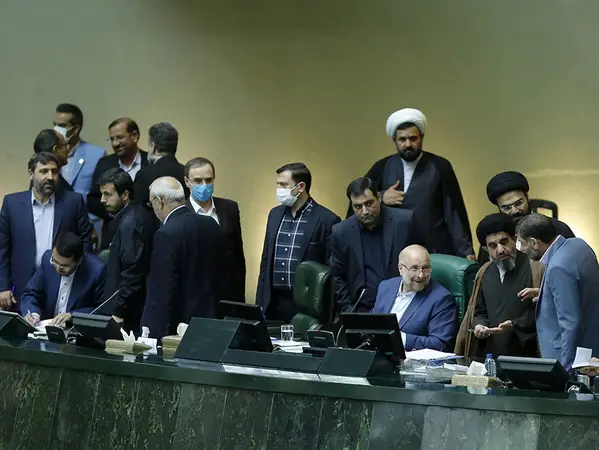Iran daily, controlled by the Raisi government, has criticized parliamentary amendments to the draft budget it says would widen the deficit in next fiscal year.
The parliamentary committee tasked with examining the government’s draft budget has rejected its proposed transfer of half the oil revenue earmarked for the National Development Fund (NDF). The fund is due to take 40 percent of Iran’s oil income, albeit severely curtailed since 2018 by United States oil sanction.
Iran newspaper pointed out that any major change in budget numbers would lead to a larger budget deficit with "considerable consequences for the government and the country's economy." It would “muddle all of the government plans pertaining to taxes, its expenditure, the budget allocated to development and other things.”
Vahid Shaghaghi, an advisor to the minister of economy, backed the newspaper’s criticism of the parliamentary committee’s proposals. He estimated they would add 1,370 trillion rials ($5.5 billion) to the projected deficit in the government’s draft budget put at around 3,000 trillion rials by Hadi Qavami, a deputy at the Economy Ministry ($11 billion) in January.
"The parliament should not disarrange the structure, form and key variables of the budget bill,” Shaghaghi told the official news agency IRNA. “They will impose a [larger] deficit on the government if they increase or decrease the value of indicators or jumble revenue figures … [leading to] discontent for which the government will be held to account.”
The parliamentary committee has also suggested that the government needs approval from Supreme Leader Ali Khamenei for its proposal to borrow from the NDF. In 2020, Khamenei did not agree with the Rouhani administration's plan to transfer money from the NDF.
Tempting pot
The NDF, and its predecessor the Oil Stabilization Fund, is intended to ringfence a portion of oil income for capital investment, but even before ‘maximum pressure’ it proved a tempting pot for governments looking for a source of current spending.
The government’s draft budget assumes Iran sells an average 1.2 million barrels per day (bpd) of oil at $60 per barrel. The parliamentary committee has hiked this to 1.4 million bpd at $70, thereby reducing the need to draw down from the NDF.
The easing of sanctions with the possible renewal of the 2015 nuclear deal remains an imponderable, and Iran’s production capacity and growing domestic consumption also complicate budget calculations.
Iran is currently selling around 1 million bpd of oil. Analysts are unsure what it might sell if sanctions are eased with the revival of the 2015 nuclear deal, or how quickly Iranian oil might return to markets.
“If sanctions are eased, the gradual addition of up to 1.3 million b/d [barrels per day] of extra oil over the remainder of 2022 and into 2023 could help stabilize global inventories and prevent a further ramp up in prices,” Reuters market analyst John Kemp wrote Wednesday.
Realities on the ground
The parliamentary committee is also disagreeing with the government’s proposal to stop allocating foreign currencies at a below-market rate of 42,000 rials to the dollar for essential imports while assuming a general rate of 230,000 rials. Instead, the committee proposes to earmark $9 billion in foreign currency.
Speaking to Aftab News, former conservative lawmaker Gholamali Jafarzadeh said the whole budget process had “no connection with the realities on the ground.”
